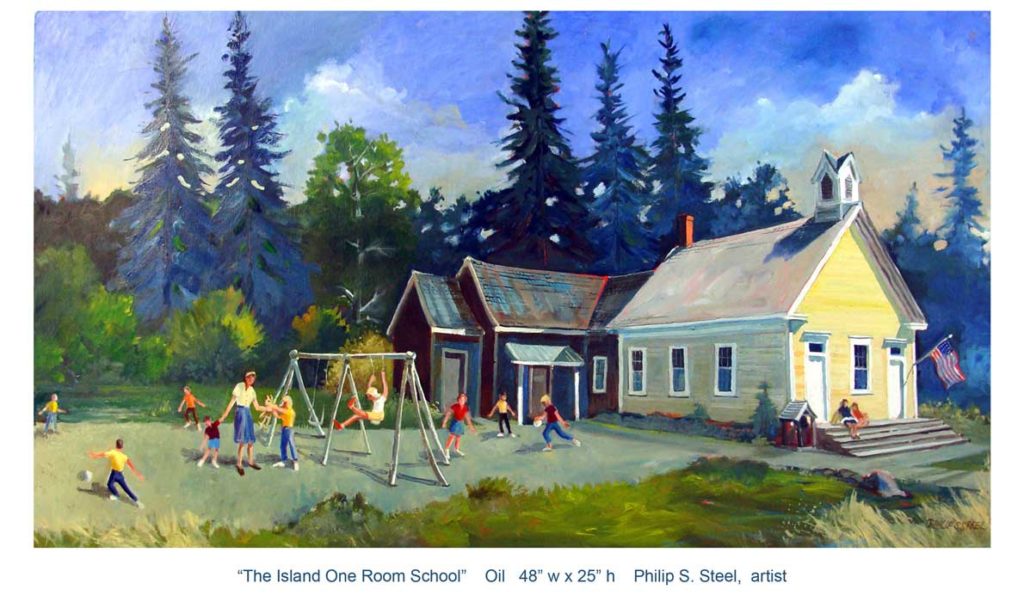A mom who owns a small business arrives just in time, having raced home from her store to help get dinner on the table and then raced off again for a school board meeting. She joins her fellow board members, who include two other parents, a lobsterman grandfather, and a retired mainland educator turned year-round island resident.
These are just a few of the different types of islanders who serve on their community’s school boards. The range of experience and depth of knowledge these school board members bring is significant, from those with multiple degrees and many years of experience in education, to those with the intimate local wisdom that comes from having graduated from the school they now are serving and sending their children to.
All have agreed to perform a critical civic duty at a time when the winds of change are truly “blowin’ a gale” for Maine’s public schools.
During the spring of 2015, I saw these dedicated community members in action as I sat in gyms, libraries and classrooms attending numerous island school board meetings up and down the coast, from Chebeague to Frenchboro and many in between.
As the recently appointed education director for the Island Institute, I am very curious about island schools and school leadership, so I set out to visit as many island schools and attend as many school board meetings as I could before the end of the school year. The weather often proved a formidable deterrent (especially in February), but I did make it to ten of 13 island schools and attended nine school board meetings between January and June.
Just as every island community is unique, so is every island school and school board. Yet all Maine school boards are grappling with an overwhelming number of high-stakes educational mandates and reforms. At the state level, there are four interconnected initiatives, each with its own timeline. They are: standards alignment, systemic proficiency-based practices (and diplomas), teacher and administrator evaluation systems and the new, as of this spring, Maine Education Assessment—Smarter Balanced.
At almost every school I went to, I heard board level discussion about the Smarter Balanced assessment. There was a wide range of ways that island schools and communities responded to this test. One similarity was that nearly all the school boards (not to mention teachers and students) spent a lot of time on the computer-based test that was used in Maine for the first time this spring and then abruptly discontinued.
Maine’s Department of Education is currently working to determine what the next assessment system for our public schools will be. Whether or not Smarter Balanced was a good tool to assess Maine students, there were likely many school board members who breathed a sigh of relief when the state announced it will no longer be using Smarter Balanced, as the roll out did generate a lot of concern and criticism from parents, teachers and students.
In addition to all of the state initiatives, island school boards also have to contend with the perennial local issues that often pull them out of their policymaking role and into a managerial one. Although the job of a local school board is to direct the educational program through establishing policies, our island school boards are regularly called upon to weigh in on a dizzying array of issues.
I heard about everything from broken vacuum cleaners and raccoons digging for grubs on school grounds to emotionally charged personality conflicts and the tricky calculus of coordinating ferry schedules and school calendar graduation events (from either 5th, 8th or 12th grade depending on the school).
After spending 18 years as an island school counselor before joining the Island Institute staff, I know first hand that all members of the school community care about the students and want what’s best for them; that is something we all have in common even if we disagree on what “best” means or are not actively involved in or aware of what is happening at our local school.
In the midst of all this change and the huge range of issues schools face, employing a hands-off or business-as-usual approach is not going to work. Now more than ever, schools need strong leadership. School board members, with their deep understanding of island life and frequently with familial “skin in the game,” have an opportunity and an obligation to act boldly.
Rather than getting overly distracted by the local problems that often dominate, school boards must spend most of their time and energy educating themselves and their communities on the complex larger school reform issues that will have potentially generations-long impact on island education and ultimately the viability of year-round island communities.
Yvonne Thomas is the Island Institute’s education director.





